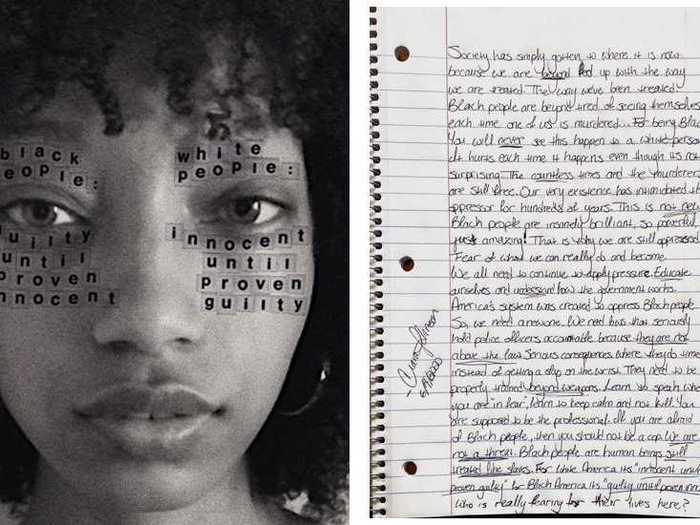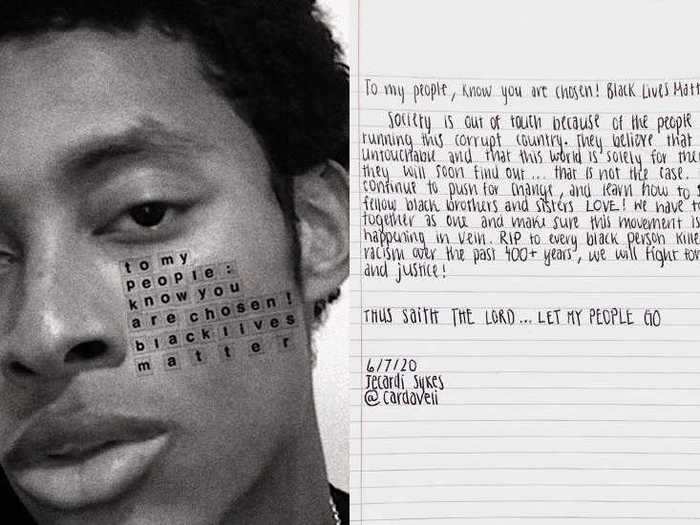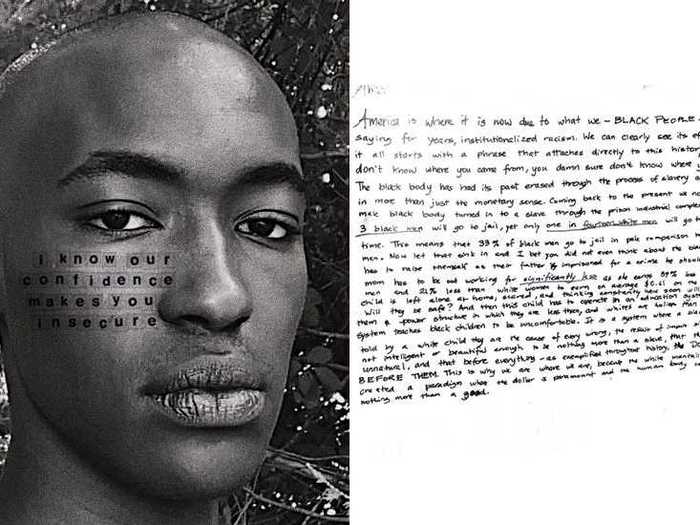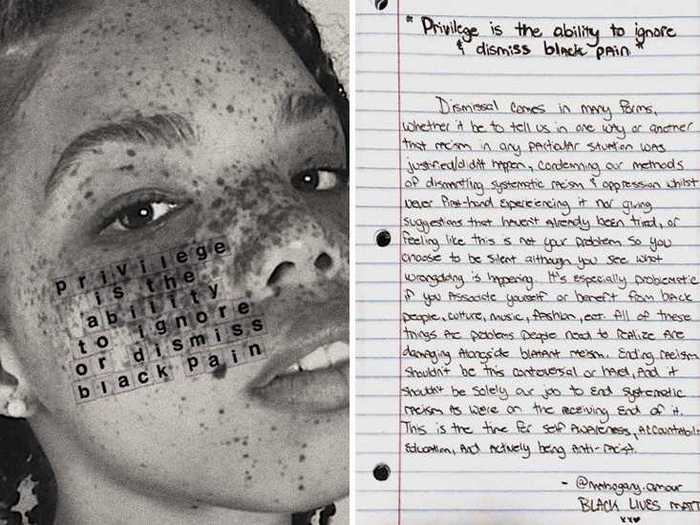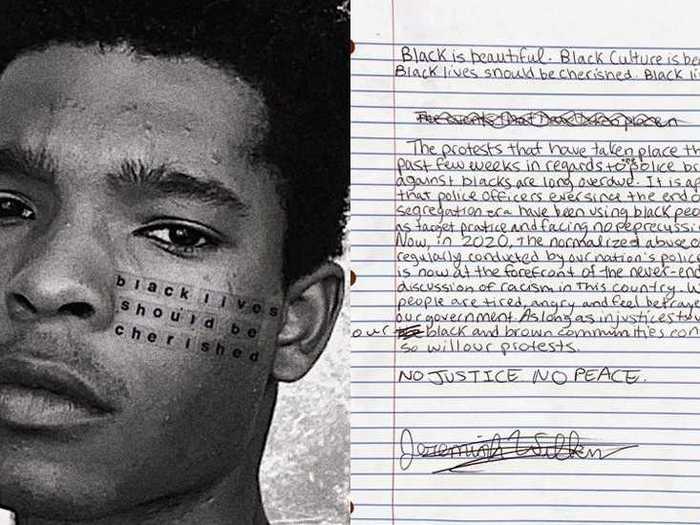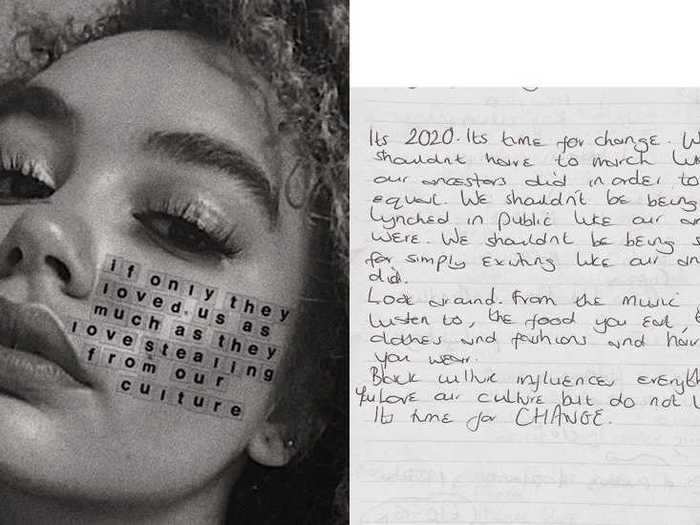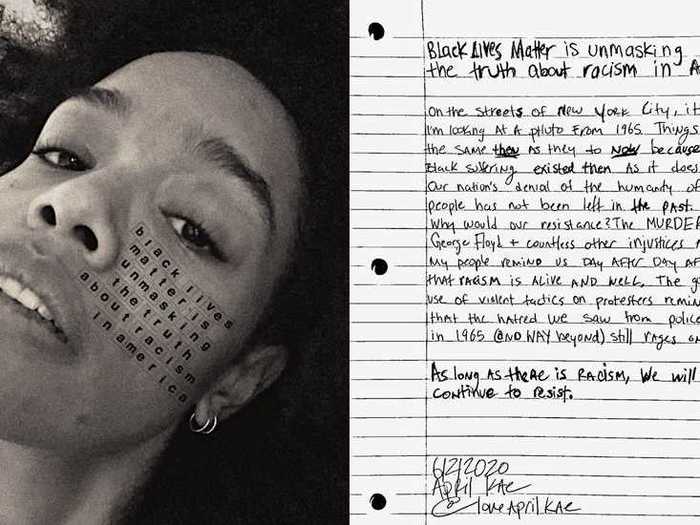Models Jeremiah Wilkins and April Kae in Peter DeVito's portrait collection.Peter DeVito - Peter DeVito is a photographer known for capturing portraits that convey powerful messages through word overlays.
- For DeVito's latest series, "Black Voices Matter," he highlighted the stories and experiences of Black models through unique photos taken completely over FaceTime.
- Models wrote accompanying journal entries that inspired the phrases added to their faces in the final photos.
- Insider spoke with models featured in the series and DeVito about the meaning and process behind the photos.
In the wake of the murder of George Floyd, who died at the hands of a Minneapolis police officer on May 25, many people have translated emotions and conversations about racial injustices in the US into works of art — from murals and music to digital illustrations.
One of many artists to use their talents to add to the Black Lives Matter discourse is New York-based photographer Peter DeVito, whose signature style of portraiture features physical words on models' faces as a storytelling mechanism.
DeVito's technique often relates to a larger story or issue, or helps relay a universal meaning he hopes to convey in his art.
For example, he's implored the effects in a photo collection about embracing acne and different skin types, and a series where he shed light on incidents of discrimination toward the Asian community.
DeVito is now capturing photos as part of a new series called "Black Voices Matter," and he's doing it all over FaceTime.
"I was inspired to do this project because I wanted to create something that helped amplify Black voices," DeVito told Insider.
Because in-person photo shoots are not an option in light of coronavirus-related restrictions on gatherings and travel, DeVito did some experimenting with friends and found that he could effectively photograph people over a video call.
The photographer starts by inviting models of color — many of whom he's worked with before on previous projects — to a 10- to 15-minute FaceTime call. On the video call, DeVito asks the models to stand "near whatever windows they have in their house" to make for optimal natural lighting conditions.
"You can't control a lot of factors over FaceTime, so at first it felt very limiting, but I have realized that being limited forces you to get more creative," DeVito said, adding that he used photo-editing software instead of actual stickers to create the phrases that appear on the models' faces for this photo shoot.
The tiny letters that DeVito adds to the models' photographed faces are not purely for aesthetic purposes; they are smaller phrases from personal journal entries written by each model about their stories and experiences as Black Americans.
"We should all be listening to what Black people are saying and thinking and sharing their thoughts. Their opinions matter the most because they are the ones being affected," DeVito said.
Keep reading to see a selection of the powerful portraits.
"I want to see more shades of Black cast for shoots, on set, and filling up more spaces at the top," Ciara Johnson said.
Ciara Johnson.
Peter DeVito
In reflecting on her participation in DeVito's project, Johnson told Insider that she hopes other industry professionals prioritize highlighting diverse voices.
"I want to see artists, photographers, and creatives keeping the same energy they have now for Black voices forever," Johnson said. "This is not some trend that should be forgotten in a few weeks."
"Our voices are important," Jecardi Sykes said. "We should speak up and be able to come together for the good of our people."
Jecardi Sykes.
Peter DeVito
Jecardi Sykes, photographed above, told Insider that he hopes people take emotion and inspiration from the photo series.
"Our voices are important," Sykes said. "We should speak up and be able to come together for the good of our people."
"I would like to see artists, photographers, and creatives come together to continue amplifying Black voices by actually investing in our communities," Abdou Lewee-Fall told Insider.
Abdou Lewee-Faal.
Peter DeVito
Lewee-Fall said he hopes that moving forward, creative directors, brand leaders, and artists continue to prioritize not only photographing or depicting Black people but also including their voices.
"For far too long have our voices and actions been dismissed, especially in the creative realm," Lewee-Fall said in reflecting on the photo shoot. "It's finally time for people such as artists, photographers, and creatives to come together to not only put our voices above their own, but to learn that we should be treated as our own distinct culture, not as a lifestyle."
"I lend my voice, because why not?" Mahogany Wade said. "The ones who have lost their lives all deserve one more voice."
Mahogany Wade.
Peter DeVito
Speaking to Insider, Wade said that opportunities like participating in DeVito's "Black Voices Matter" photo shoot are examples of how she can be a voice for her larger community.
"The innocent people alive today deserve one more voice, and my future Black children and the upcoming Black generations deserve me fighting for them to be able to have their voice and their lives," Wade said.
She continued: "My platform may not be huge, but if I can inform my audience, and my audience informs theirs, we all can be informed and make differences that can hopefully help reach what we seek to accomplish."
"Black is beautiful. Black culture is beautiful. Black lives should be cherished," Jeremiah Wilkins wrote in his journal entry.
Jeremiah Wilkins.
Peter DeVito
"This project is special to me because it challenged me to articulate all the feelings of pain and anger I tend to internalize in regards to being Black in America," Wilkins said.
Wilkins also noted the cathartic quality of journaling, which he said was a special part of the portrait series.
"Putting my thoughts onto paper for the first time on the topic of Black Lives Matter was beyond therapeutic for me. I hope that through my experience and message I encourage other people of color to express their beliefs and stories on their own platforms," Wilkins said.
"It's 2020. It's time for change," model Sonny Turner wrote.
Sonny Turner.
Peter DeVito
In Sonny Turner's journal entry, she wrote: "It's 2020. It's time for change. We shouldn't have to march like our ancestors did in order to be equal. We shouldn't be being lynched in public like our ancestors were."
Turner continued, writing: "We shouldn't be being shot for simply existing like our ancestors did. Look around — from the music you listen to, the food you eat, the clothes and fashions and hairstyles you wear — Black culture influences everything. You love our culture but do not love us. It's time for change."
In her journal entry, April Kae wrote: "Black Lives Matter is unmasking the truth about racism in America."
April Kae.
Peter DeVito
"On the streets of New York City, it's like I'm looking at a photo from 1965," April Kae wrote. "Things looked the same then as they do now because Black suffering existed then as it does now."
"As long as there is racism, we will continue to resist," she wrote in her journal entry.
DeVito said that the "Black Voices Matter" project is ongoing (at the time of writing), and he will continue to add photos on Instagram via his personal page and an account dedicated to the series. DeVito's work can also be found on his website.

